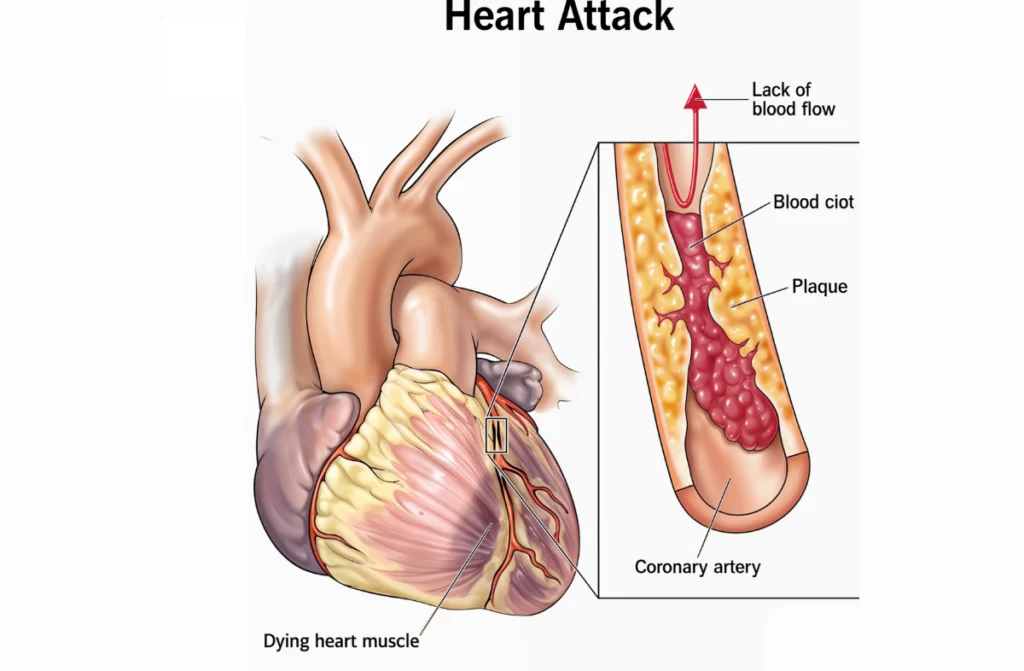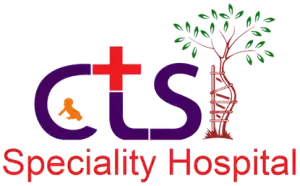Heart attack recovery is a vital phase of healing that requires proper guidance and support. At CTS Hospital, we understand the importance of a structured and personalized recovery plan, helping patients regain their health and confidence after a heart attack. Our dedicated healthcare team ensures that you are supported every step of the way, offering the expertise and resources needed for a successful recovery.
What’s the Usual Timeline for Heart Attack Recovery?
- 6 to 12 Weeks
Most people start feeling better within 6 to 12 weeks. During this period, the body begins to heal, but energy levels and stamina may still be low. - Full Recovery
Full recovery may take several months to a year. It’s important to follow your doctor’s advice and take the time you need for healing. - Patience is Key
Heart attack recovery varies from person to person. Recovery depends on the severity of the attack and individual health conditions.

Things You Might Experience While Healing from a Heart Attack
- Fatigue
Early on, you may experience tiredness and limited physical endurance. Rest is essential. - Physical Discomfort
Muscle pain, breathing difficulties, and chest discomfort may occur as your body heals. - Emotional Changes
Anxiety or depression are common. Professional counseling or support groups can help in dealing with these feelings.
Key Takeaways
- Start with light activities and gradually increase as you feel stronger.
- Emotional recovery is just as important as physical recovery—don’t hesitate to seek support.
- Stick to your doctor’s advice for medications, diet after heart bypass, and exercise.
Physical Activities to Help Heal After a Heart Attack
Exercise plays a key role in heart attack recovery, but it’s essential to approach it carefully and gradually.
- Cardiac Rehabilitation: Under the guidance of a doctor or rehabilitation expert, start with low-impact activities, such as walking or stationary cycling. Cardiac rehabilitation programs are tailored to help your heart heal and rebuild strength.
- Aerobic Exercises: Walking, swimming, or cycling can help improve heart function, but it’s important to avoid overexertion at first.
- Strength Training: Once your doctor gives the green light, light strength training exercises can help build muscle strength and support overall recovery.
Eating Right for a Healthy Recovery After a Heart Attack
A heart-healthy diet is one of the most significant aspects of heart attack recovery. What you eat can affect the health of your heart and reduce the risk of future heart problems.
- Eat More Fruits and Vegetables: Rich in vitamins, minerals, and fiber, they can help lower cholesterol and blood pressure. Aim for a variety of colors to ensure you’re getting a range of nutrients.
- Choose Lean Proteins: Opt for fish, poultry, beans, and legumes. These protein sources are healthier for your heart compared to red meat.
- Limit Unhealthy Fats: Avoid trans fats and limit saturated fats to reduce the risk of further heart complications.
Is Complete Heart Healing Possible After a Heart Attack?
Yes, many individuals can experience significant recovery after a heart attack, although it depends on the damage done to the heart. However, in cases where the heart muscle was severely damaged, some individuals may experience lasting effects such as reduced heart function. This will greatly affect life after a heart attack, and ongoing care is necessary to manage any long-term effects.
- Heart Healing: Your heart has the ability to heal, but it may not return to its pre-heart attack condition. Rehabilitation and medical treatment can help improve function.
- Ongoing Care: Continued lifestyle changes, regular check-ups, and medications are essential to maintaining heart health after recovery.
Steps to Take for a Smooth Recovery After a Heart Attack
Recovering from a heart attack involves a combination of physical and emotional healing, with a focus on long-term health. Here are some important steps to follow:
- Follow Medical Advice: Adhere to your doctor’s guidelines on medications, exercise, and diet. Taking prescribed medications consistently can prevent complications.
- Avoid Stress: Try to limit stress and engage in relaxation techniques such as deep breathing, meditation, or yoga. Stress can negatively impact heart health.
- Attend Follow-Up Appointments: Regular check-ups are essential to ensure that your heart is healing and that no complications arise during recovery. This is part of what to do after a heart attack to maintain ongoing health and monitor progress.
Adjusting to Lifestyle Changes Following a Heart Attack
Life after a heart attack recovery involves making adjustments to prevent future heart attack and improving overall quality of life.
- Prioritize Health: Focus on a heart-healthy diet, regular exercise, and proper stress management. These lifestyle changes are key to minimizing the chances of another heart attack and recovering from a heart attack.
- Stay Positive: Many people experience increased levels of optimism after surviving a heart attack. Set realistic goals and celebrate small successes along your recovery journey.
- Stay Socially Active: Maintain social connections, as this can improve emotional well-being and reduce feelings of isolation during recovery.
Life Expectancy After a Heart Attack by Age: Understanding the Impact
The Life expectancy after heart attack by age can be influenced by factors like age, overall health, and the severity of the attack.
- Younger Patients: People who are in their 40s or 50s have a greater chance of a full recovery and a higher life expectancy after a heart attack compared to those in their 60s or 70s.
- Older Patients: Older individuals, particularly those with additional health conditions, may face a longer recovery period and potential complications. However, with proper care and lifestyle adjustments, many older individuals still lead fulfilling lives post-heart attack.
Can the Heart Recover After a Heart Attack?
The heart’s ability to recover after a heart attack depends on the damage to the heart muscle. If only a small part is affected, full Heart Attack Recovery is more likely. However, severe heart attacks may lead to slower recovery and long-term damage. Life expectancy after heart attack by age also influences recovery, with younger individuals generally having better outcomes.
- Partial Recovery: Even if the heart does not fully recover, many individuals can live well with the proper treatment and lifestyle changes.
- Medical Support: Medications, surgery, or medical devices such as pacemakers can help manage the condition and improve heart function.
What to Do After Heart Attack: The Next Steps in Your Recovery
What to do after a heart attack is crucial to a successful recovery. Here are the essential steps you should follow after a heart attack:
- Get Plenty of Rest: Give your body time to heal and regain strength. Take short naps and avoid overexerting yourself during the early stages of recovery.
- Rehabilitate Your Heart: Participate in a cardiac rehabilitation program to learn exercises and habits that will help your heart recover safely and effectively.
- Follow a Healthy Lifestyle: Quit smoking, reduce alcohol consumption, and manage weight to improve overall heart health.
Conclusion
Heart attack recovery is a journey that requires time, patience, and the right medical support. At CTS Hospital, we are committed to providing you with the best care, guidance, and resources as you recover. If you or a loved one is recovering from heart attack, don’t hesitate to reach out to us for further assistance. Our team is here to help you with your recovery from heart attack process and ensure the best possible outcome for your health and well-being.
